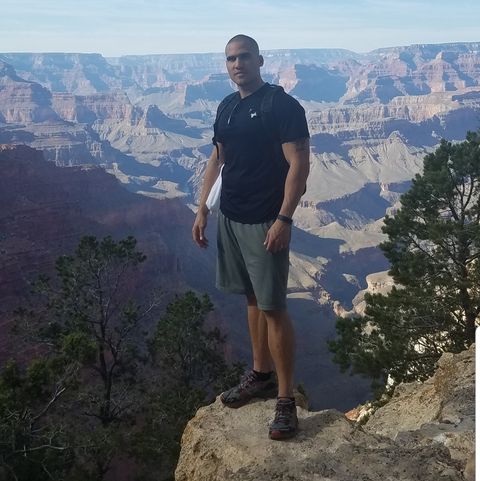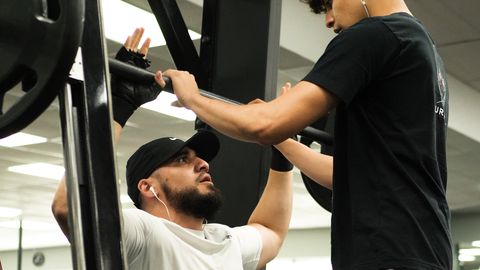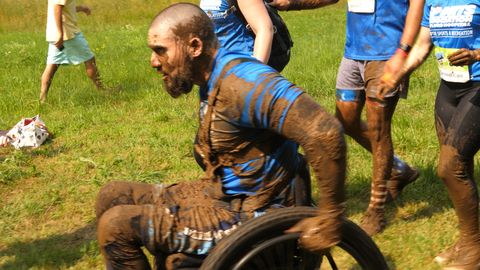The accident happened on a June day sometime around noon, though Jason Ross tells Men’s Health that he doesn’t recall much from that morning. He remembers that it was a Sunday, that it was sunny, and that it was a perfect morning for a ride. Ross had parked his motorcycle at his brother’s house, so he and his son took the car to pick up the bike. Ross then hopped on his motorcycle. His son took off in the car. The two drove on, son in front, father behind.
They drove on together until a traffic light separated them. Jason Jr. later told his father that when he had turned back, the bike was gone. He must have gone for a joy ride, the son thought. His father was always active and independent like that, often waking up early, before Jason and his brother, Jacob. He would hit the gym, come home, and get ready for work. After work and school, the three would hang out. Then Ross would go back to the gym. Jason checked behind once more, but his father was still absent.
Back at the intersection, as the red light turned green, Ross turned left to follow his son in the car. But a vehicle sped up in front of him, trying to cut him off. Ross swerved. He lost control and went barreling toward a curb. Then, he says everything went black.
When Ross awoke, he was lying on his back. He saw familiar faces. Ross worked as a volunteer fire fighter in town, and his friends now crowded around him, the first responders. There was an ambulance with them. Ross says he wondered if Jason saw the accident. He prayed he did not. Things began to blur as he was lifted into the ambulance. “Why can’t I move my legs? Why can I move my feet?” he remembers asking. Then, he was being pushed toward a helicopter to Yale New Haven Hospital, where he was taken into surgery.
“I didn’t understand what had happened. Why am I not moving? Why am I here? Why is this happening?”
Ross had suffered a T12 spinal cord injury. The surgeon implanted metal rods and twelve screws to stabilize Ross’s spine. By the time Ross awoke, he was paralyzed from the waist down.
“I didn’t understand what had happened,” Ross says. “Why am I not moving? Why am I here? Why is this happening? These thoughts turned to: This is not actually happening; this is not real; I’m just going to wake up; it’s a bad dream. And then: Oh my god, this is reality. Now what’s going to happen? How am I going to take care of my kids? How am I going to continue working? How am I going to go on in life? What’s the point of even living anymore?”

Jason Ross
Ross was told that the other car just kept driving, and no one had identified the driver. He had fire and police friends look into it, but their search came up empty.
The first time Ross’s boys came to see him, he remembers they were noticeably distressed at seeing their father in his bed-ridden state. He felt their dejection. But then a couple weeks later, when they walked into his room, Ross saw something different. They were positive. They asked questions. Their attitudes helped to flip a switch in Ross. “They showed me that they’re still happy, that they know what happened, and that they’re gonna make the best of it,” he says. “I thought to myself: Stop being negative, stop being down, and show them that life goes on.”
Ross dropped his search for the perpetrator.
He spent two months in rehab before going home for the first time. He had to learn everything again, almost every activity he once thought normal. The new normal became his greatest challenge. “I don’t know what was in me,” he says, reflecting on those first months. “I don’t know how I was able to fully push it all aside and take it head on and go.”
Friends came to renovate Ross’s basement to make it more wheelchair accessible. Ross was able to work from home and adapt his vehicle with hand controls. He could drive. He could continue with his job at the bank. But Ross was inactive and frustrated. Finally, after being motivated by his kids, Ross went back to the gym.

“When I started going back to the gym, I was unsure of what I can do,” he remembers. “I got on the bench and started to do just the bar. My kids were there helping stabilize me by holding my legs. I was able to do the bar, and I was like: okay! I threw two 45 plates on. I was surprised that I was able to get a good number of reps in. So I started going up in weight. I was like: Man, I got no lower half, but my upper body is still here. I’m still here.”
Ross remembered his first days in rehab at Gaylord Specialty Healthcare. The day he was admitted the Gaylord Sports Association was holding a 5k obstacle course race. He remembered watching the competition then, his nurse beside him. “That could be you next year,” he had been told. He didn’t believe it. In January, six months after the accident, Ross returned for some physical therapy. He saw a sign on a bulletin board for the race. He thought to himself: hey, why not?
The race gave Ross a goal. Though he was able to lift weights, he had lost ability to use his core, making many movements impossible. His cardiovascular strength was also depleted. Ross changed his diet to accommodate. He turned to a high-protein diet–boiled eggs in the morning with oatmeal, small snacks every few hours to curb hunger (fruit and veggies), and then healthy lunches and dinners. He would push himself on trail hikes with his boys, allowing his heart rate to rise without allowing himself to rest.

On June 22, almost exactly a year after the accident, Ross completed the Gaylord 5k. His sons and brother ran beside him. “The look on their faces when I accomplished my goal of crossing the finish line–no words can explain,” says Ross, proudly. “And I can see in them looking at me: Oh my God, dad, you still did it. Nothing is more uplifting.”
Ross has already tackled rock climbing and archery. And he hopes to keep going: basketball, kayaking, waterskiing, rugby–all in his future.
There was a time in the hospital when Ross wondered how he might find the motivation to live. But then he had the realization. “There was no point in dwelling on the negatives,” he says. “It’s time to make the best of the situation. My kids motivated me to get up and do what I had to do. And then I was like, hey listen, I’m going to embrace what happened. I’m going to go forward.”
Source: Read Full Article
